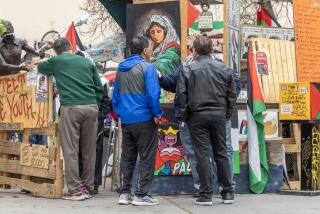Speaking With One Voice : Feminism: A diverse group discusses education, child care and grass-roots organizing and learns how to ‘work for women.’
- Share via
The “F” word was spoken right before lunch. Esther Valadez, a partner in Affordable Housing Associates, warned she would say it:
Feminist .
“Do not be afraid to form organizations for women. There is nothing embarrassing about being a feminist, nothing embarrassing about working for women.”
From start to finish, the conference “Women Count: Finding Your Political Voice” could have served as a lively and continual double-take for those who confine “feminism” to upper-middle class white women on a career track.
The conference aimed, said chairwoman Christine Lyon, to reach women who are “not necessarily politically involved” and to stress how politics affects issues that concern them.
Panelists and participants represented all major ethnic groups, ages, educational and economic backgrounds, and led a diverse group of about 200 women through discussions on education, child care, economic development and self-sufficiency, health care, personal safety and grass-roots organizing.
But for all the diversity, there seemed near consensus at the Saturday conference at USC on the oft-repeated message: If women want action on the issues that concern them, they will have to do it themselves.
* Attorney Abby Leibman, managing director of the California Women’s Law Center, recalled a letter Abigail Adams wrote in the early 1800s to her husband, then-President John Adams: “ ‘Remember the ladies,’ she asked him.
“Well, he forgot. We’re going to have to do more than write letters.”
Minimally, Leibman said, women must vote. Maximally, they should run for office. In between, she said, they should give time, money or both to women candidates.
“The truth of this country is power is made by men, for men,” Leibman said, and it was high time women stop timidly begging male politicians, “Excuse me, would you do something, just a little bit, about child care? It’s important to me.”
* Rebuild L.A. was criticized as a case in point more than once: “Women and children have been lost,” Valadez said, citing such necessities as linking job training, day care, latch-key programs and support for small business enterprises.
Referring to the “magic promise” that accompanied Rebuild’s establishment, businesswoman Marva Smith Battle-Bey asked, “Where’s the rabbit? I haven’t seen the rabbit yet. Kuwait rebuilding was faster than rebuilding L. A. Let’s face it, ladies.”
Battle-Bey, president of the Vermont-Slauson Economic Development Corporation, said women should develop their own financial resource strategies: “Women must save ourselves. We have to stop waiting. We are asking the system that has perpetuated the conditions to fix them. It will never work.”
* Sweet Alice Harris, a community activist and founding director of Parents of Watts, asked how the system that has locked out women and their concerns got started. Once a teen-age single mother, who then married and raised 14 children, Harris answered her own question. Women had stayed in the kitchen, provided their men with a good breakfast and proudly sent their men off to “the job,” welcoming them home with a nice supper and a supportive attitude.
“We learned,” she said, referring to those husbands who worked in government and politics. “He made the laws and we are living by those laws. But men don’t know how to make child-care laws. They haven’t been in the labor room. We know what to do. So now we need to take back the job and do it.”
* During the personal-safety discussion, panelists predictably deplored the victimization of women in the courtroom--in rape, sexual-harassment, spousal-abuse cases.
“The defense is a defense of intimidation,” attorney Carla Barboza warned. Saying her practice had almost doubled since the Anita Hill/Clarence Thomas hearing last year, she nevertheless cautioned that “the courtroom is not a safe place” for women.
And Maria Doest, chief instructor at KarateWomen, offered preventive advice--and a demonstration by her students--on how to avoid becoming a victim.
“When we’re born they slap those pink booties on our feet,” Doest said dryly. From then on, “everything we’re taught is the exact opposite of self-defense: ‘Don’t yell.’ ‘Don’t fight back.’ ‘Johnny hit you? He did that because he likes you. Don’t hit back.’ ”
When not teaching karate, Doest works as a stunt woman: “I want to change how women are depicted,” she said, miming a helpless, paralyzed feminine response to being attacked.
* For all the criticism of the status quo, however, Saturday’s atmosphere was more determined and hopeful than angry. It was not by accident that such an ethnically diverse group came together, and that they did so in city torn by ethnic strife, which has been exacerbated by a bleak economy.
“Our community is an international one,” said Korean-American attorney Angela Oh, who served on the state Assembly’s special committee on the L. A. crisis after the April riots.
“It was not invigorating,” Oh said of her committee work. “It made me frustrated and angry.”
The committee looked at the causes, she said, when they have been known for 27 years, well-documented in earlier reports of the McCone and Kerner commissions.
Now, she said, things are worse. The community has lost 300,000 jobs in the last five years, she said, and a new Los Angeles, rather than a rebuilt one, is needed--a city where small business development, child care and a transit system are crucial to the future.
And yet, the need to work together for a new city comes at a time when ethnic relations grow increasingly complex and tense, Oh said.
She recalled her late grandmother, who could not speak English, but “was able to connect with people. We’ve lost that ability and it’s saddening.” Oh challenged seminar participants:
“I think maybe the only place where it’s still possible to connect is in the women’s community. We’ve got to get down to talking about what scares people about each other.”
Added Barbara Pieper, an L. A. County Board of Education trustee: “You may ask, ‘Why would you want to put yourself between the dog and the fire hydrant?’ Some of us do. Get out there and support them. If we have more women, the agenda will change.”
More to Read
Sign up for Essential California
The most important California stories and recommendations in your inbox every morning.
You may occasionally receive promotional content from the Los Angeles Times.










